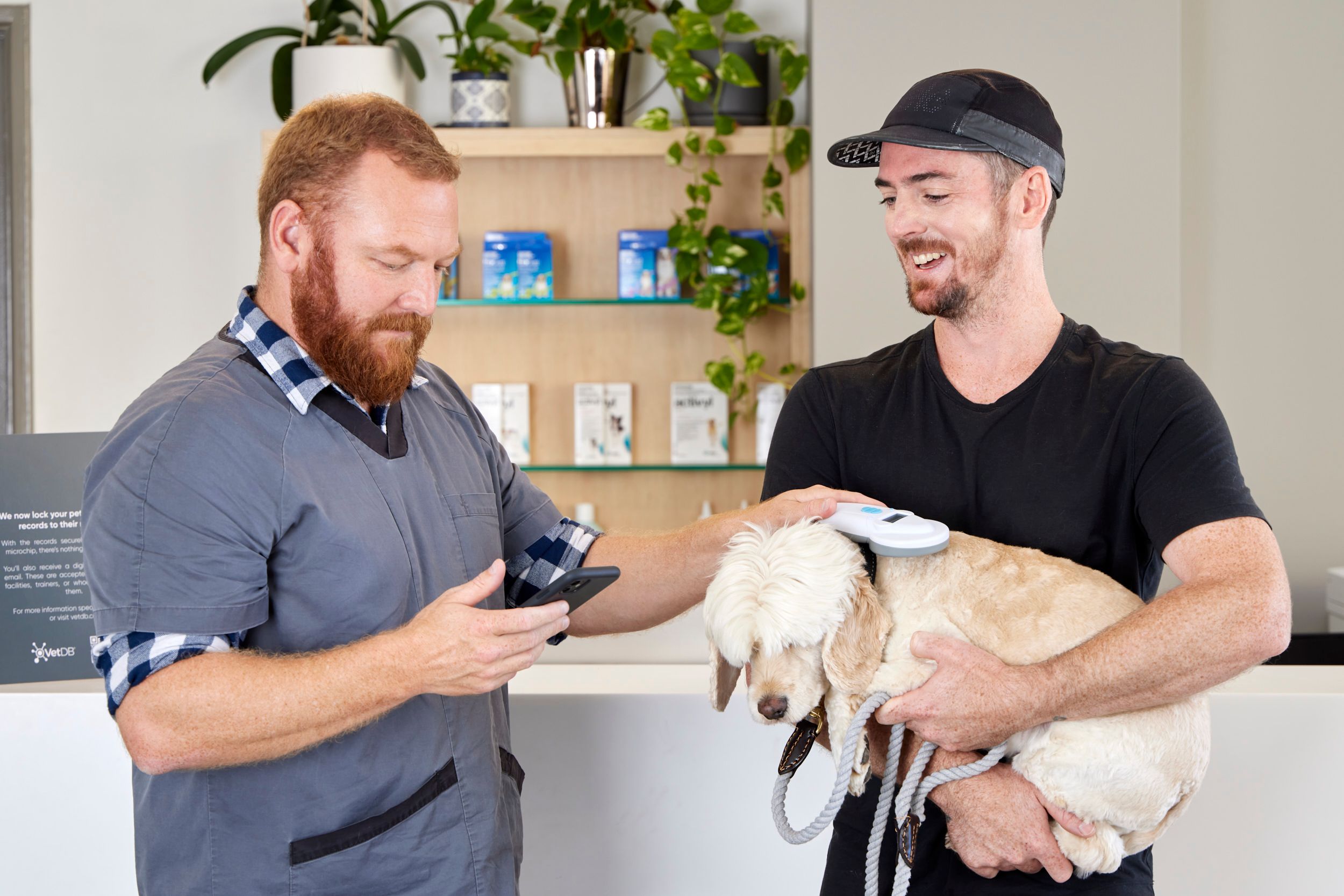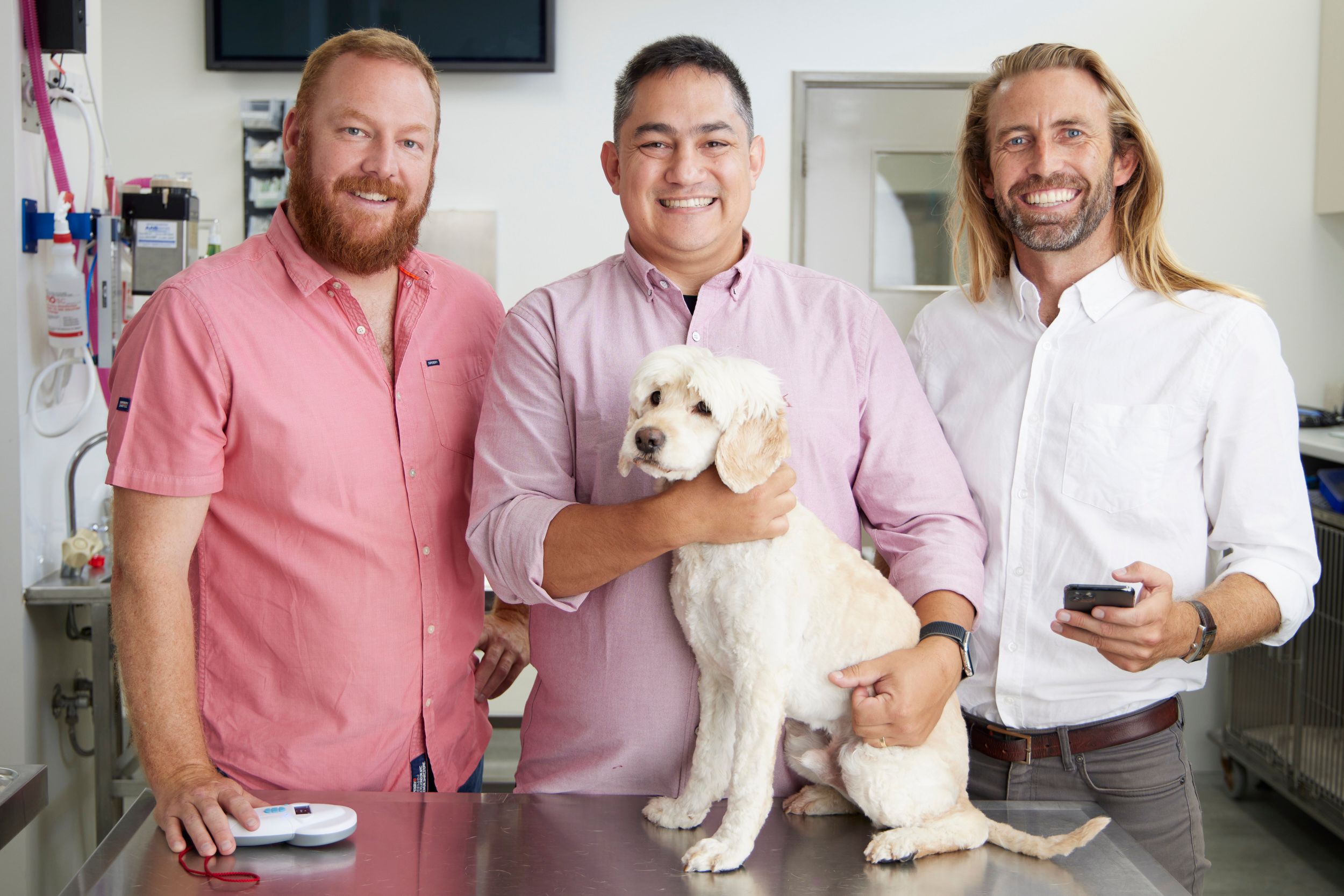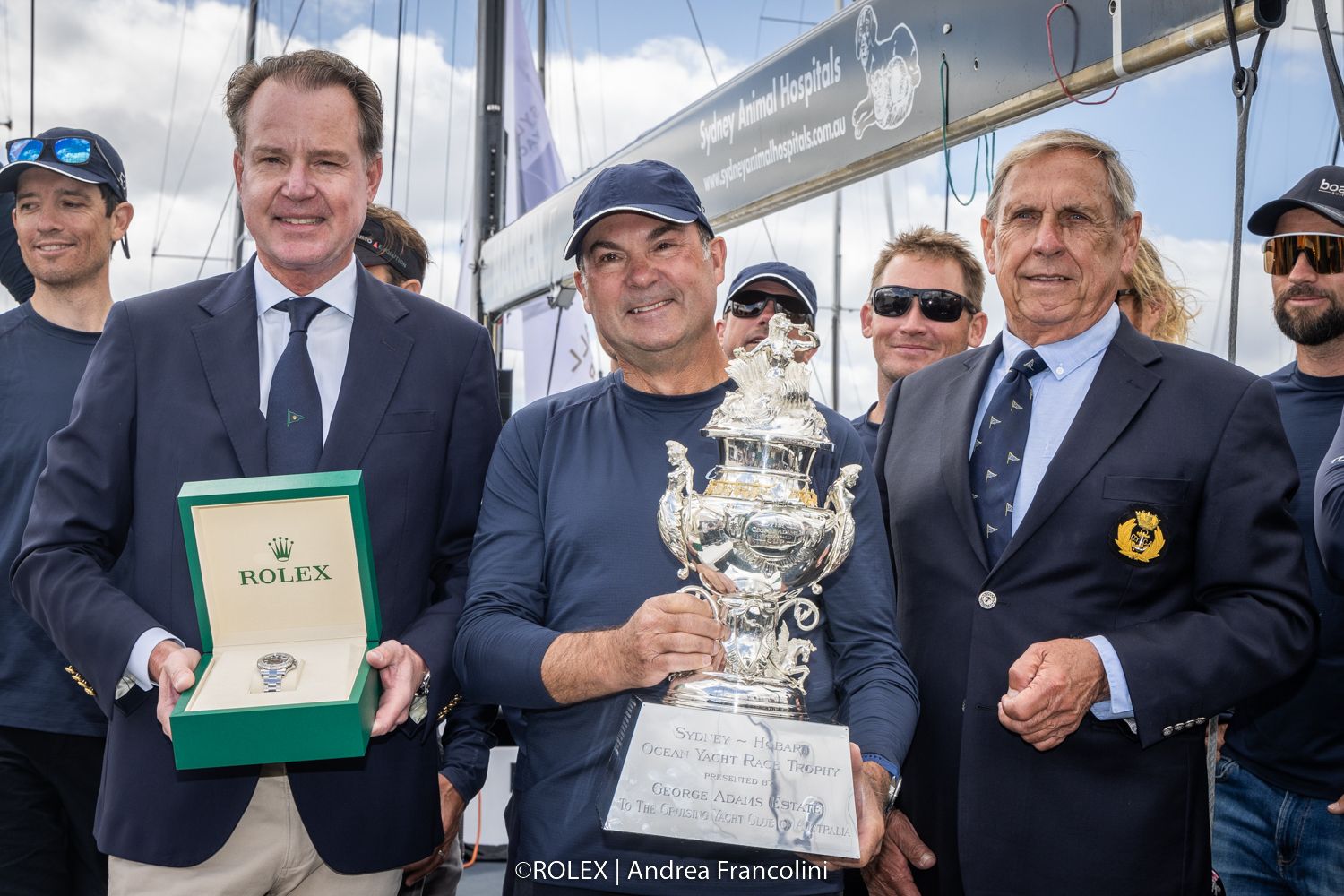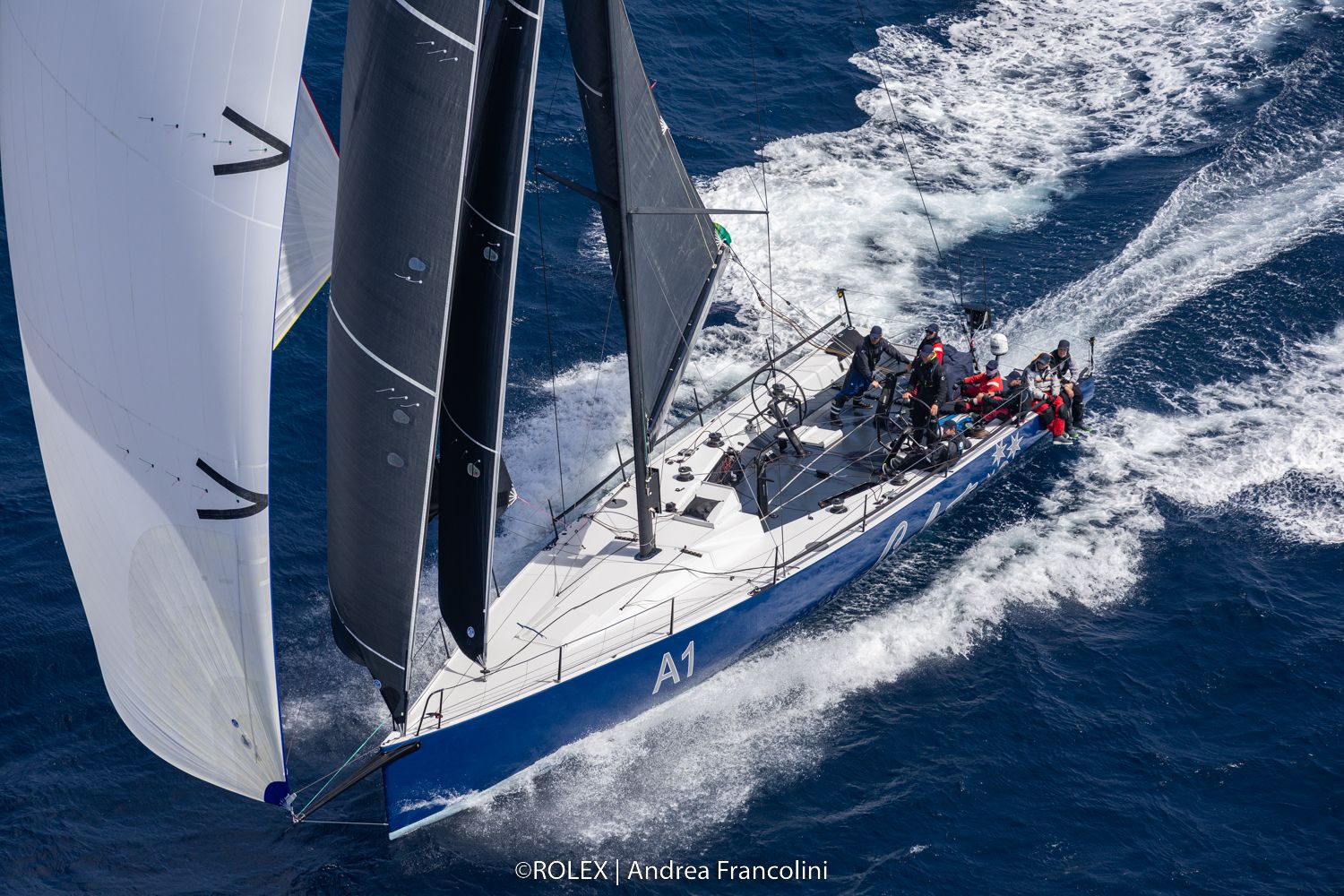Veterinary scene Down Under: Universal health record program plus a veterinary sailor’s victory
Innovative universal health record platform locks health data to an animal’s microchip; and the veterinarian who skippered the winning yacht in the 2022 Rolex Sydney to Hobart Yacht Race
Universal animal health record platform
The Australian-based veterinary technology start-up Vedi (formerly VetDB) is hitting its stride on the international stage, having secured AUD $3million in its latest funding round from 2 of the most respected animal health funds in the world, global animal health and pharmaceutical company MSD Animal Health, a division of Merck & Co, and the pet-focused New York VC Companion Fund.
Vedi in action (Photo courtesy of Vedi).

The additional funding will be used to expand Vedi’s medical record technology for pets. Vedi is a universal health record platform that captures then locks important health data to an animal’s existing microchip. Other veterinary professionals can then access and update that record over the animal’s lifetime.
“This funding signals the serious industry backing behind our technology on a global scale. Vedi creates vast efficiencies in the vet practice. It arms veterinarians with a better medical history, automates complex tasks and allows them to work with pathology labs, microchip registries and more at the touch of a button,” explained Vedi's chief executive officer and veterinarian Steve Joslyn BSc, BVMS, DipECVDI, MRCVS, MANZCVS.
To date, Vedi has been focused on developing its technology and demonstrating the need for a universal health record that connects the veterinary ecosystem.
“Getting broad adoption and buy-in for a completely innovative technology is challenging, but Western Australia—where we’re based, has been the perfect environment to build a digital ecosystem like this. Vedi is now supporting over 85,000 pets, and growing by over 1,500 a week, and now we’re expanding our network across Australia and the United Kingdom,” said Joslyn.
“Vedi is already being used daily by leading animal-industry organizations in Western Australia, including microchip registries, clinical pathology laboratories, emergency and referral hospitals, crematoriums, plus individuals such as general practice vets and pet owners.”
Vedi founders (left to right) Dr Steve Joslyn, Anton Tjea, Ross Wyness, and Hugo the dog (Photo courtesy of Vedi).

Having received a positive reception at the London Vet Show in November 2022, Vedi plans to bring on more UK-based veterinary practices this year.
“This year our focus is on putting this technology into the hands of more veterinary professionals around Australia and in the UK. It’s been a tough time in the veterinary sector of late and we believe Vedi can help ease some of the pain as our easy-to-use tools save time and reduce the mental load,” said Joslyn.
“While getting the product out there is a major priority, we’ll never stop expanding our range of features and partnerships. We have plenty to announce this year!”
Celestial win for veterinary sailor
Sam Hanyes with award and Celestial Crew (Photo courtesy of ROLEX - Andrea Francolini).

The Rolex Sydney to Hobart Yacht Race which heads out of Sydney Harbour annually on Boxing Day is arguably one of the worlds most gruelling and challenging yacht racing events, with yachts and crews pitted not only against one another but contending with treacherous winds and seas over the course of the 625 nautical mile race.
The overall winning yacht of this year’s event was Celestial, a carbon-constructed 52-foot grand prix race yacht skippered by Sydney veterinarian Sam Haynes BSc, BVMS, GCM(VP), who along with his crew fought a hard race to achieve the win after being relegated to second in the previous year’s event.
“Winning the 2022 Rolex Sydney to Hobart Yacht Race Tattersall Cup for the overall victory is a stunning result. I am absolutely thrilled to have won. It is very satisfying for myself and my crew, particularly after the 2021 edition where we were relegated from first to second place, after a technical protest that resulted in a time penalty. Celestial, up to that, had the fastest corrected time and we believed we had the cup,” shared Haynes with dvm360®.
Sailing on Celestial (Photo courtesy of ROLEX - Andrea Francolini).

“The 2022 overall win has been a redemption story. Celestial has been the fastest boat, on corrected time—the overall winner of the Rolex Sydney to Hobart Yacht Race receives the Tattersall Cup, which is the handicap time corrected trophy—for 2 years in a row, which is elite. This time we have achieved the win and are the undisputed champions. That is an amazing story and we are so proud of the achievement.”
Considered one of the pinnacle races in worldwide yachting, competing in the Rolex Sydney to Hobart Yacht at the top level requires immense planning, training, practice and teamwork. Haynes’ day job as hospital director and owner of the Sydney Animal Hospital's group of veterinary practices has provided a useful grounding for him to pursue competitive yacht racing.
“The team behind the yacht is very important. I believe getting the culture spot-on is the most important step. This is definitely something that I have experienced in managing our veterinary practice group. The stress that occurs in a vet hospital is actually not dissimilar to that in a yacht racing team. Culture comes to the fore when the team is tired, worn out, when things are not going to plan. Then the ability to pick oneself up, look for the positives and reset are important attributes,” explained Haynes.
“Having a strong culture results in a strong team. People want to sail on the Celestial for that reason and so we have a team that has worked together for several campaigns and they know each other, they look out for each other and they respect each other’s abilities. Putting a team together takes time. Getting the right people and keeping them is a massive step forward in a competitive sport. It’s very similar in the veterinary business. Retention, upskilling, training, communication. And, having fun while doing it!”
The Celestial crew raise funds for Assistance Dogs Australia, of which Haynes is a director, a charity that provides fully trained assistance dogs to people with mobility needs, autism or post-traumatic stress.
“I have been a director at the Assistance Dogs Australia for over 10 years which broadens my interests and gives me the opportunity to help in the community through this amazing charity. I have been running my veterinary business for 32 years and I still really enjoy the profession, what I get to do from both the practice management point of view and the veterinary work that I still am involved,” said Haynes.
“A big part of my keeping things balanced is having a very fulfilled life outside the profession. I am doing a lot of competitive sailing now, something I began during my university studies in Perth. This was around the time of the 1983 America’s Cup and I was in Fremantle during the defence, having just graduated, so I was around sailing at an exciting time for the sport in Australia.”